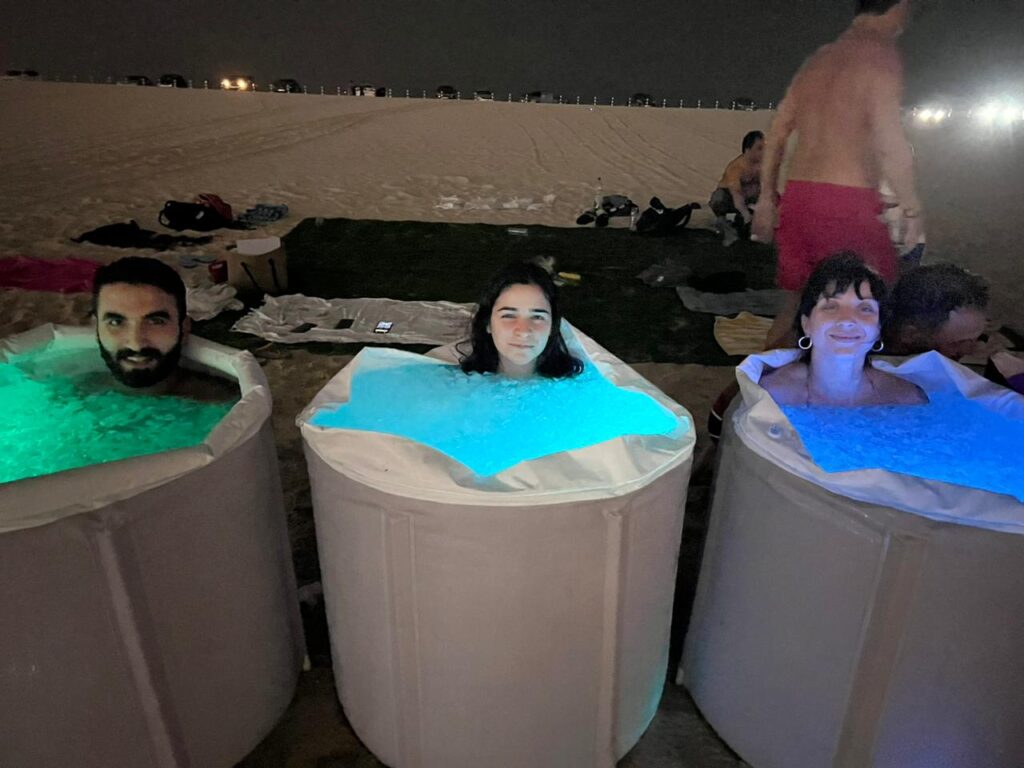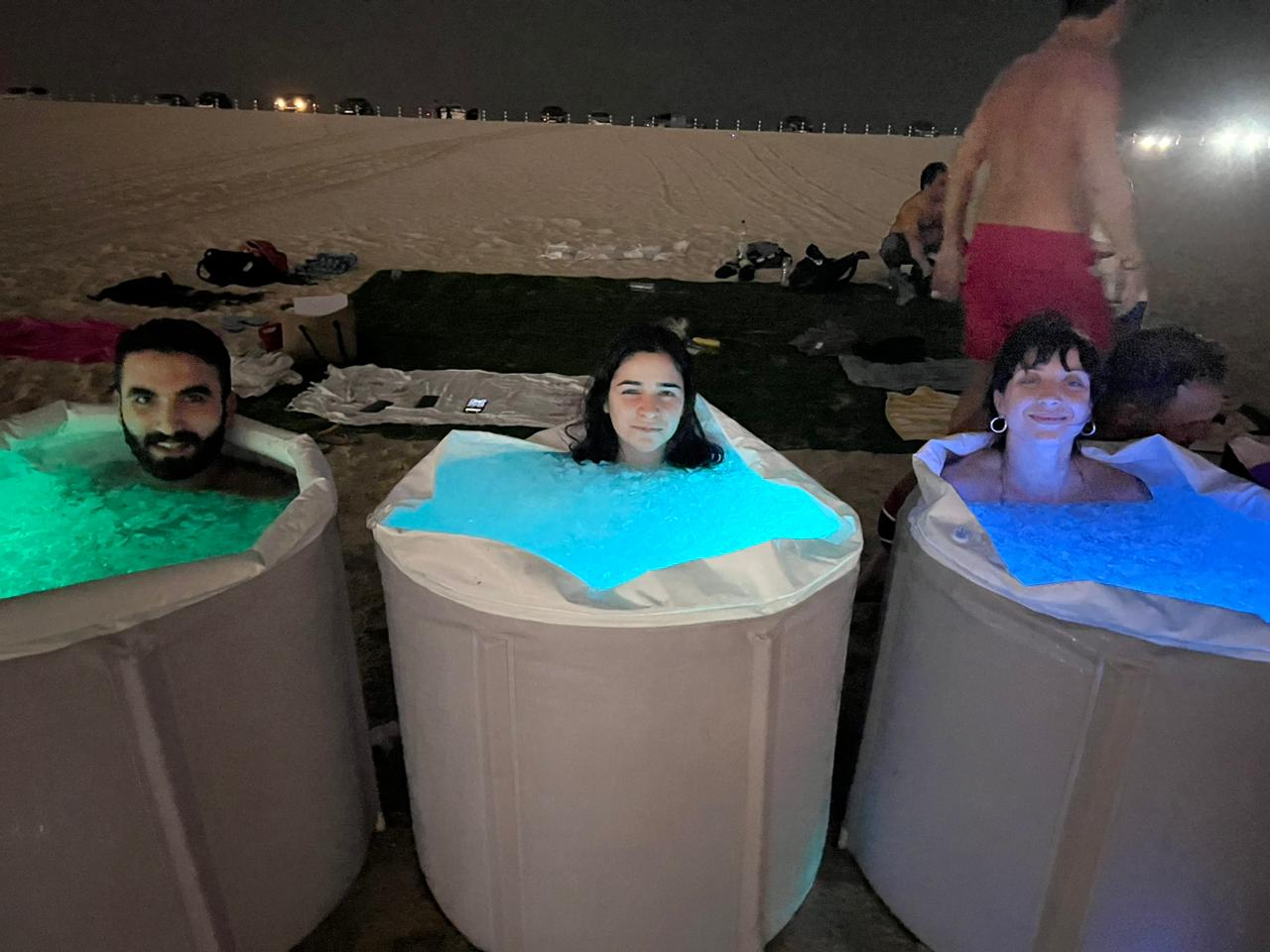In the quest for holistic well-being, humans have always been intrigued by the diverse ways nature can impact our health. One such intriguing practice gaining momentum is ice water therapy. Derived from ancient traditions and modern research, this therapy involves subjecting the body to cold water, yielding a multitude of potential benefits.
In this blog, we will delve into the mechanism behind ice water therapy and explore its array of benefits that span physical, mental, and even spiritual dimensions.
Table of Contents
Understanding Ice Water Therapy

Ice water therapy, which is sometimes referred to as cold water therapy or cold exposure therapy, is a therapeutic practice that revolves around subjecting the body to cold temperatures. This can take various forms, including full-body immersion in cold water, targeted application of cold water to specific body parts like hands or feet, or even the practice of taking cold showers.
The fundamental idea underpinning this therapeutic approach is deeply embedded in the body’s innate response to cold stimuli.
At its core, the therapy taps into the body’s remarkable ability to adapt to challenging environmental conditions. When exposed to cold, our bodies instinctively react, triggering a cascade of physiological responses designed to maintain our core temperature, which is vital for our survival. This natural response to cold is what ice water therapy harnesses and amplifies for potential health benefits.
In essence, this therapy encourages us to intentionally subject ourselves to the discomfort of cold in a controlled and systematic manner, all in pursuit of promoting physical and mental well-being. By doing so, we are essentially engaging in a dialogue with our own bodies, prompting them to activate their defense mechanisms against the cold.
Through the practice of ice water therapy, we learn to harness the potential benefits of cold exposure, which may include improved circulation, enhanced immune function, mental resilience, and heightened alertness. This method not only aligns with the wisdom of ancient practices but also finds validation in contemporary scientific research.
Intriguingly, it invites us to rediscover the symbiotic relationship between our bodies and the natural world, acknowledging that our well-being is intimately connected to our ability to adapt and thrive in diverse environments. So, whether it’s the invigorating shock of a cold shower or the refreshing dip into icy waters, it serves as a gateway to tap into the profound wisdom of our own bodies and the therapeutic potential of the natural elements around us.
How It Works
When your body encounters cold water, it reacts in a clever way to protect itself and keep you warm inside. The main move it makes is called “vasoconstriction.” It’s like drawing a shield around your blood vessels. This shield keeps warmth inside and pulls blood away from your arms and legs, where it can lose heat quickly.
So, while you’re in the cold water, your body focuses on keeping your important organs, like your heart and brain, warm and working properly. This helps you stay alive and avoid getting too cold, which can be dangerous.

Once you’re out of the cold water, your body does another move called “vasodilation.” It’s like opening the gates to your blood vessels again.
This allows warm blood to flow back into your arms and legs, bringing back the feeling of warmth and life.
So, when you feel that comforting warmth after being in the cold, it’s your body’s way of getting everything back to normal.
It’s pretty amazing how your body can adapt to different situations to keep you safe and sound.

Discover the perfect itinerary
with All Out UAE App.
✓ Effortless experience
✓ Unforgettable adventures
Benefits of Cold Water Therapy
Enhanced Circulation:
The alternating constriction and dilation of blood vessels during cold water exposure and recovery can promote better circulation. Improved blood flow can potentially enhance oxygen and nutrient delivery to cells while aiding in the removal of waste products.
Boosted Immune System:
Cold exposure has been linked to an increase in the production of certain immune cells and anti-inflammatory markers, potentially bolstering the immune system’s effectiveness.
Reduced Inflammation:
Cold water therapy might help reduce inflammation by restricting blood flow to inflamed areas and subsequently promoting a controlled inflammatory response. This can be beneficial for athletes or those recovering from injuries.

Mental Resilience:
Engaging in cold water therapy challenges the mind’s capacity to endure discomfort. Regular exposure can help build mental resilience, potentially translating to better stress management and an improved ability to handle challenging situations.
Elevated Mood:
Cold water exposure is believed to trigger the release of endorphins and other mood-enhancing neurotransmitters, contributing to a sense of euphoria and increased energy levels.
Skin and Hair Health:
Cold water exposure can tighten pores and cuticles, potentially leading to healthier skin and hair. Cold showers are often recommended for those seeking to maintain the vitality of their skin and hair.
Improved Sleep Quality:
Cold exposure has been associated with improved sleep quality due to its impact on the body’s thermoregulation processes. It can help regulate body temperature, promoting a more restful sleep.
Metabolic Benefits:
Some studies suggest that regular cold exposure might stimulate brown adipose tissue (BAT), a type of fat that burns calories to generate heat. This could potentially contribute to weight management.
Precautions & Considerations
While cold water therapy offers a plethora of benefits, it’s important to approach this practice with caution:
Gradual Progression:
Beginners should start with shorter exposure times and gradually increase them as the body adapts to the cold.
Individual Differences:
People with certain medical conditions, such as cardiovascular issues, should consult a healthcare professional before attempting cold water therapy.
Avoid Overexposure:
Prolonged exposure to cold water can lead to hypothermia, which can be dangerous. Always be mindful of the body’s signals and exit the cold water if feeling excessively cold or experiencing discomfort.

Cold water therapy, an age-old tradition rooted in ancient practices and bolstered by contemporary scientific research, beckons us to embark on an exhilarating journey towards improved well-being. This therapeutic technique, characterized by its profound effects on circulation, immunity, mental resilience, and various other facets of our health, represents a holistic avenue for enhancing both our physical and mental states. However, like any endeavor aimed at fostering wellness, it is imperative to approach ice water therapy with a mindful and measured perspective, progressively building our resilience while accounting for individual health considerations.
Embracing cold water therapy is akin to rediscovering an ancient wisdom that has stood the test of time. Its origins trace back to cultures and civilizations that revered the therapeutic potential of cold water immersion, recognizing its ability to invigorate the body and nurture the spirit. This timeless wisdom has now found validation in the realm of modern scientific inquiry, as research continues to unveil the manifold benefits of this practice.
One of the cornerstones of cold water therapy is its profound impact on circulation. The shock of cold water against our skin prompts our blood vessels to constrict, redirecting blood flow to vital organs and tissues. This not only enhances overall cardiovascular health but also contributes to improved skin tone and a radiant complexion. Moreover, the subsequent rush of warmth as the body adapts to the cold can be an exhilarating experience, generating a sense of vitality and vigor.
In addition to its circulatory benefits, cold water therapy has been shown to bolster our immune system. Cold exposure can stimulate the production of white blood cells and activate the body’s natural defense mechanisms, making us more resilient to illness and infection. This fortification of our immune response is particularly valuable in our modern world, where immunity is of paramount importance.

